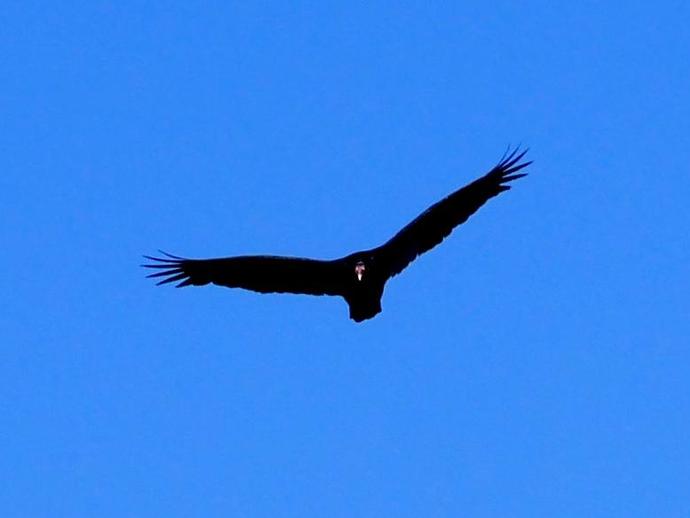February 23, 2021
Ben here with the Tuesday edition of #BenInNature presented by our friends at Carter Bank & Trust!
The turkey vulture (Cathartes aura) is not exactly one of the most beloved birds out there. In fact, they have some pretty gross habits, so you might want to hold off on reading this one until after lunch. However, these birds play a critical role in nature, and if we didn't have them around, we would definitely miss them!
So why don't people like turkey vultures? First and foremost, folks probably wouldn't be crazy about seeing bluebirds if they only showed up to eat dead things. Turkey vultures are carrion feeders, preferring to eat meat that's fairly fresh. They fly low over the ground and can smell a compound called ethyl mercaptan, which is produced when a dead animal is first beginning to decay. Once they smell something that's died, they'll land and begin feeding on it. This is also why they don't have feathers on their heads (which is where they get the name "turkey" vulture): by having a bald head, they don't have to worry about rotting meat and bacteria getting stuck to their feathers while they're tearing apart a carcass.
Contrary to popular belief, turkey vultures don't kill live prey, although the black vulture (Coragyps atratus) will sometimes kill newborn animals. Turkey vultures sometimes join flocks of black vultures, so perhaps it's a case of guilt by association.
So what other gross habits do turkey vultures have? Well, for one thing, they poop on their own legs so that the evaporation of the fluids will cool them off, a process known as "urohidrosis." In addition, while adult turkey vultures are rarely preyed upon by other animals, if they do feel threatened, they will defend themselves by vomiting on their attacker. It would certainly deter me!
While the turkey vulture isn't exactly a bird you'd invite over for dinner, we would be in rough shape if they weren't out there doing their thing. These birds play a crucial role in disposing of carrion, which is a breeding ground for bacteria and disease. They deserve credit for their hard work cleaning up our forests and roadsides. Fortunately, turkey vultures are protected under the Migratory Bird Treaty Act of 1918, and here in the U.S., it's illegal to kill or possess a turkey vulture or their eggs.
BONUS TRIVIA QUESTION! There are three species of New World vultures found in the United States. One is the turkey vulture, and another is the black vulture (Coragyps atratus). What is the third species? Post your answer in the comments below! If you're the first to get it right, you'll get one Official #BenInNature Brownie Point!
ABOUT #BenInNature
Social distancing can be difficult, but it presents a great opportunity to become reacquainted with nature. In this series of posts, Administrator of Science Ben Williams ventures outdoors to record a snapshot of the unique sights that can be found in the natural world. New updates are posted Monday - Friday, with previous posts highlighted on the weekends. This series of posts is made possible thanks to the support of VMNH Corporate Partner Carter Bank & Trust (www.cbtcares.com)
NATURE PHOTO IDENTIFICATIONS
If you discover something in nature that you would like help identifying, be sure to message us right here on Facebook with a picture (please include location and date of picture) and we'll have our experts help you identify it!

 Hours & Admissions
Hours & Admissions Directions
Directions

